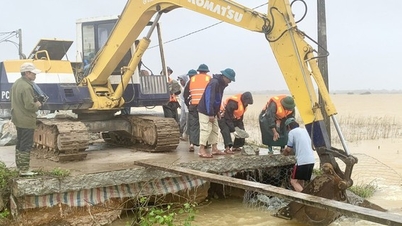
Proposal for a national database on cadres, civil servants and public employees in state agencies.
According to the Ministry of Home Affairs , the National Database on cadres, civil servants and public employees (CBCCVC) in state agencies has been built and maintained in recent times, achieving certain results such as forming a National Database on CBCCVC data; forming databases and information systems for managing CBCCVC in state agencies. Initial results show that the application of science, technology and digital transformation in the management of CBCCVC has received attention and been implemented synchronously in state agencies.
However, in practice, data still lacks synchronization and connectivity between agencies in the political system, data quality is still limited, there is a delay in updating because data has not been collected and updated immediately during the process of processing operations on the electronic information system or the information systems and software do not meet the requirements of processing operations; there is a lack of a platform for managing civil servants and public employees, including the function of analyzing, exploiting and using data effectively, leading to the failure to promote the value of data serving state management as well as leadership, direction and operation in the field of civil servant management; it has not ensured "correct - sufficient - clean - alive - unified - shared" as the guiding viewpoint of the Central Steering Committee in Plan No. 02-KH/BCĐTW.
The practice of national digital transformation in recent times has pointed out some limitations in building, connecting and sharing data between agencies in the political system such as "connecting and sharing data between information systems is still ineffective; the value of data has not been promoted"; the development of applications and databases has not been associated with the completion of institutions regulating the updating, exploitation and effective use. This is also a limitation in the practice of developing, exploiting and using the national database on civil servants and public employees in recent times.
The Ministry of Home Affairs believes that the issuance of a Decree regulating the national database of civil servants in state agencies is an urgent requirement to institutionalize the Party's policies, ensure unity, modernity and efficiency in the management of civil servants, and contribute to promoting national digital transformation.
The draft Decree aims to reduce and simplify administrative procedures through the use of data and electronic civil servant records to replace paper records; and the use of data services to replace traditional reporting, synthesis, and statistical activities on civil servants based on documents. The Decree also stipulates that the agencies in charge of building, updating, and developing the civil servant management information system ensure synchronization, connection, and communication with the national database and the Civil Servant Management Platform.
The Draft Decree consists of 6 Chapters, 44 Articles and 1 appendix.
The Draft Decree consists of 6 Chapters, 44 Articles and 1 appendix, regulating electronic records; building, updating, managing, exploiting and using the National Database on civil servants and employees in state agencies. In particular, there are some notable contents as follows:
Applicable subjects include 3 groups:
(i) Cadres and civil servants as prescribed in Article 1 of the Law on Cadres and Civil Servants 2025;
(ii) Civil servants as prescribed in Article 1 of the Law on Civil Servants 2025. At the same time, to ensure unified management, the Decree stipulates that the subjects of application include employees receiving salaries from the state budget;
(iii) Agencies and public service units of the Communist Party of Vietnam ; State; National Assembly; Vietnam Fatherland Front and socio-political organizations. Not applicable to agencies, organizations and people working in the People's Army, People's Public Security and cryptographic organizations.
The Draft Decree regulates data of the National Database, which clearly defines that it includes data on civil servants, public employees and workers (including data groups that fully reflect the information specified in the current CV), and electronic profile data. The draft also defines which data is the master data of the National Database, which data is reference data and the reference data management agency for the purpose of connecting and sharing data.
Each officer and civil servant has a unique profile with an identification code for management during the entire working period.
Notably, the draft Decree devotes a separate chapter to electronic records of civil servants and public employees. The contents stipulate electronic records, requirements for electronic records, management of electronic records; creation, use, update, and storage of electronic records. Specifically:
The draft Decree stipulates that electronic records include electronic CVs and electronic components of paper records; each record is assigned a unique identification code to serve management work in the digital environment.
The profile identification code is managed in a unified and synchronized manner with the resume code; the electronic profile has a required format synchronized with the paper profile, meeting the management requirements in the digital environment instead of paper profiles. The signing and confirmation of profile components in the electronic environment is done by specialized digital signatures ensuring full requirements as for paper profiles.
The draft also stipulates the conversion from electronic records to paper records and vice versa in cases requiring the use of paper records in personnel work.
Regarding the creation and updating of electronic records, methods and means of creation and updating, the draft Decree stipulates that each civil servant is only allowed to create one unique record with an identification code for management during the entire working period in a state agency, for unified use. The electronic records of civil servants are created as soon as they are elected or recruited, linked to the electronic recruitment process in the digital environment or created by the management and using agency.
The Draft Decree also stipulates responsibilities, obligations, and procedures for updating electronic records. It stipulates that the agency using civil servants is obliged to initiate; civil servants are obliged to update basic information and data related to themselves; the agency using civil servants is obliged to update information and data about civil servants for information and data generated from the management of civil servants. The agency using civil servants is obliged to authenticate and approve by digital signature the data updated by civil servants before updating it to the system and synchronizing it to the national database.
Data updating is done on the CBCCVC management platform of agencies or on the national cadre, civil servant and public employee management platform.
We invite readers to read the full text and comment on the draft here.
Snow Letter
Source: https://baochinhphu.vn/som-hoan-thien-co-so-du-lieu-quoc-gia-ve-can-bo-cong-chuc-vien-chuc-102251103173033628.htm


![[Photo] Ca Mau "struggling" to cope with the highest tide of the year, forecast to exceed alert level 3](https://vphoto.vietnam.vn/thumb/1200x675/vietnam/resource/IMAGE/2025/11/04/1762235371445_ndo_br_trieu-cuong-2-6486-jpg.webp)

![[Photo] Panorama of the Patriotic Emulation Congress of Nhan Dan Newspaper for the period 2025-2030](https://vphoto.vietnam.vn/thumb/1200x675/vietnam/resource/IMAGE/2025/11/04/1762252775462_ndo_br_dhthiduayeuncbaond-6125-jpg.webp)

![[Photo] The road connecting Dong Nai with Ho Chi Minh City is still unfinished after 5 years of construction.](https://vphoto.vietnam.vn/thumb/1200x675/vietnam/resource/IMAGE/2025/11/04/1762241675985_ndo_br_dji-20251104104418-0635-d-resize-1295-jpg.webp)
![[Photo] Ho Chi Minh City Youth Take Action for a Cleaner Environment](https://vphoto.vietnam.vn/thumb/1200x675/vietnam/resource/IMAGE/2025/11/04/1762233574890_550816358-1108586934787014-6430522970717297480-n-1-jpg.webp)


































































































Comment (0)